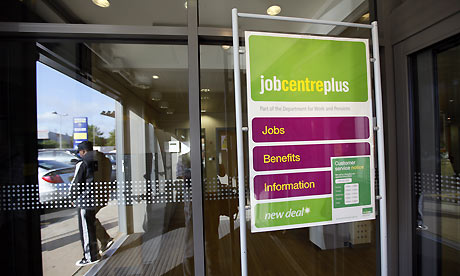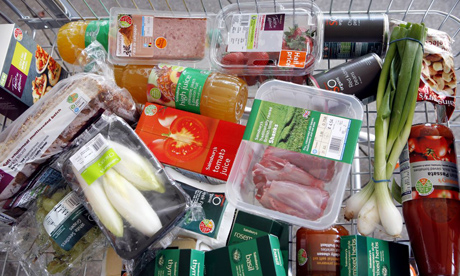Surprise fall in UK unemployment raises hopes worst may be over
• ILO measure of unemployment fell 7,000 to 2.458 million
• Claimant count drops 15,200 to 1.61 million
• Government claims success in 'helping people through the recession'
• Bank of England voted 9-0 to hold rates and QE
• Datablog: find out the figures where you live
Unemployment unexpectedly fell in the three months to November, official data showed today, raising hopes that the worst may be over for the labour market.
The Office for National Statistics said the broad International Labour Organisation measure of unemployment fell by 7,000 to 2.458 million, the first quarterly decline since the period from March to May 2008, which leaves the jobless rate at 7.8%.

Economists had expected unemployment to rise. Photograph: David Sillitoe
Meanwhile, the narrower claimant count measure dropped by more than expected in December, by 15,200 to 1.61 million.
But the improvement masked an increase in the number of people in the labour force who are neither working nor looking for work, with the inactivity rate rising to 21.2% in the three months to November, the highest since the three months to August 2007.
Yvette Cooper, the secretary of state for work and pensions, welcomed the fall and pointed out that many experts had forecast that unemployment would now be close to the 3 million mark.
"It means 450,000 fewer people are out of work than everyone expected last spring. The extra investment in jobs, education and training is making a real difference, helping people through the recession and preventing the kind of unemployment we saw in the eighties and nineties," she said.
Cooper also warned that unemployment is resume its upward path in the next few months.
Theresa May, the shadow secretary of state for work and pensions, questioned the value of government schemes such as the Future Jobs Fund, which aims to get people back into work if they have been on benefit for nearly a year.
"What we have seen all too often from this government is programmes that move people into short-term jobs, and then back into unemployment," May argued.
End of the recession?
Economists had forecast that the number of jobless would increase by around 38,000 over the quarter to 2.503 million. The unexpected decline bolstered hopes that the labour market had turned the corner, and that the UK economy has returned to growth. The official first reading of GDP for the last three months of 2009 will be released next Tuesday.
But Howard Archer at IHS Global Insight pointed out that the employment total had fallen by 14,000 in the period. This was caused by a drop of 113,000 in the number of people in full-time employment, against a rise of 99,000 in the number of people with part-time jobs.
"Despite claimant count unemployment falling by a total of 26,000 in November and December, we suspect that it is premature to celebrate the end of rising unemployment. This suspicion is reinforced by the fact that full-time employment still fell appreciably in the three months to November," he said.
Archer added further modest job shedding would occur in 2010.
"While the economy seemingly returned to growth in the fourth quarter of 2009, we suspect that the recovery will be prone to losses of momentum and that activity will not be strong enough overall in 2010 to prevent further net job losses."
John Wright, chairman of the Federation of Small Businesses, warned that many of the jobs created in the run-up to Christmas might not last long.
"Many small firms, especially in the retail sector, will have taken on seasonal staff to help them through the busy Christmas period. However, small businesses need help to make these seasonal jobs into permanent jobs and the government must lend a helping hand if small firms are to really tackle the challenge of rising unemployment," Wright said.
Separately, minutes of the latest meeting of the Bank of England's monetary policy committee showed that all nine members voted in January to keep interest rates at a record low of 0.5% and to maintain its £200bn quantitative easing scheme.
Surge in inflation set to trouble Bank of England
Inflation is now at a nine-month high and has moved substantially above the Bank of England's target level of 2%

Inflation surged in December. Photo: David Sillitoe
The rate of inflation jumped by a record amount in December, approaching the level at which Bank of England governor Mervyn King would have to write his sixth letter to chancellor Alistair Darling, explaining why inflation has crashed through the 3% threshold.
Official figures today showed the annual rate of consumer prices inflation (CPI) jumped to 2.9% in December, up from 1.9% the month before in the biggest rise since records began in 1997. Analysts had forecast an increase to 2.6%.
The Office for National Statistics said the increase was mainly due to the effects of last year's sharp falls in oil prices dropping out of the figures and VAT rising back to 17.5%, from 15%.
Describing the figure as "a very nasty shock", Howard Archer, chief UK economist at research group IHS Global Insight said even allowing for the unfavourable statistical distortions coming from sharply falling oil prices a year ago and the December 2008 VAT cut, the data "will not go down at all well at the Bank of England".
Inflation is now at a nine-month high and has moved substantially above the Bank of England's target level of 2%.
If CPI rises above 3%, King will have to write a letter to the chancellor explaining why. "Indeed, it now seems a stone dead certainty that Bank of England governor Mervyn King will be writing a 'Dear Chancellor' letter next month to explain why consumer price inflation in January rose more than one percentage point above its target level and what the Bank of England is doing about it," Archer said.
Vince Cable, the Liberal Democrat Treasury spokesman, said the figures were almost certainly a "temporary spike". "With inflation expected to fall quickly, it seems unlikely that the Bank of England would want to raise interest rates in the near future. Any recovery in the economy is still very fragile, it would be all too easy to destroy it by putting the brakes on too soon."
But he cautioned that the Bank still needed to be "acutely aware" of the longer term inflationary dangers.
"With the world economy improving at a much quicker rate than the UK, there is a danger that high food and energy prices could hit our economy before it has had a chance to recover," he said.
Inflation measured by the retail prices index, which includes housing costs and is used as the basis for many pay deals, jumped to an annual rate of 2.4%, from 0.3% the previous month. It was the highest rate since November 2008.
Sterling hit a four-month high against the euro, with the pound at €1.14½.
Mark O'Sullivan, director of dealing at foreign exchange firm Currencies Direct, said: "The current sterling rally looks like it may have the potential to move higher over the coming weeks.
"Although there are still considerable worries concerning the UK, both in its fiscal position and potential change of government, there is no doubt that January has proved the month to be long on sterling."
No comments:
Post a Comment